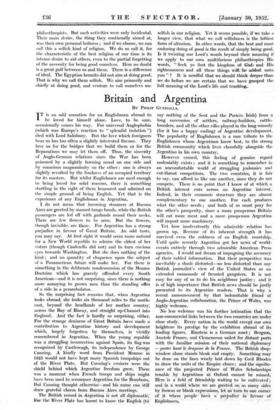Britain and Argentina
BY PHILIP GUEDALLA.
IT is an odd sensation for on Englishman abroad to 1- be loved for himself alone. Love, to be sure, occasionally comes his way. For universal Anglophobia (which was Europe's reaction to " splendid isolation ") (lied with Lord Salisbury. But the love which foreigners hear us has too often a slightly interested flavour. They love us for the bridges that we build them or for the Reparations we may let them off. Thus, the sincerity of Anglo-German relations since the War has been poisoned by a slightly fawning mood on one side and by conscious magnanimity on the other : one is always slightly revolted by the fondness of an occupied territory for its masters. But whilst Englishmen are used enough to being loved for solid reasons, there is something startling in the sight of them honoured and admired on the simple ground of being English. Yet that is the experience of any Englishman in Argentina. '
I do not mean that incoming steamers at Buenos Aires are greeted by massed tango bands, while the British passengers are led off with garlands round their necks. There are few flowers to be seen. But the flowers, though invisible, are there. For Argentina has a strong prejudice in favour of Great Britain. An odd taste, you may say. At first sight it would seem more natural for a New World republic to admire the eldest of her sisters (though Cinderella did not) and to turn envious eyes towards Washington. But she does nothing of the kind ; and no quantity of eloquence upon the subject of a Panamerican future will make her. For there is something in the deliberate condescension of the Monroe Doctrine which has gravely offended every South American—and it is not surprising, since there is nothing more annoying to grown men than the standing offer of a ride in a perambulator.
So the surprising fact remains that, when Argentina looks abroad, she looks six thousand miles to the north- east, beyond the headlands of her mother country, across the Bay of Biscay, and straight up-Channel into England. And the fact is hardly so surprising, -either. For the strange denizens of Great Britain have Made a contribution to Argentine history and development which, largely forgotten by themselves, is vividly remembered in Argentina. When the young republic was a struggling insurrection against Spain, its flag was recognized by Castlereagh, its independence by George Canning. A kindly word from President Monroe 'in 1825 would not have kept many Spanish trocipshipi out of the River Plate. But Canning's cruisers were the shield behind which Argentine freedom grew. There, was a moment when French troops and ships might have been used to reconquer Argentina for the BourbonS. But Canning thought otherwiSe--and his name can '"still` draw grateful cheers frOm Buenos Aires Meetings._ The British record in Argentina is not all diplimnatie.;. islar 'the River Plate has learnt to know the English (to say nothing of the Scot and the Forfeit° Irish) from a long succession of settlers, railway-builders, cattle- breeders, and all the other roles played in the long comedy (for it has a happy ending) of Argentine development. The popularity of Englishmen is a rare tribute to the Englishmen whom Argentinos know best, to the strong British community which lives cheerfully alongside the Argentino in his own country, However caused, this feeling Of, genuine regard undeniably exists ; and it is something to remeinber in an uncomfortable world of struggling jealousies and cut-throat competitors. The two countries, it is fair to say, can afford to like one another, since they do not compete. There is no point that I know of at which a British interest cuts across an Argentine interest. Indeed, in their economic structure they are almost complementary to one another.. For each produces what the other needs ; and both of us must pray for the other's prosperity, since a more prosperous Britain will eat more meat and a more prosperous Argentina will import more machinery.
Yet how inadvertently this admirable relation has grown up. Because of its inherent strength it has survived even the coldness of an English courtship. Until quite recently Argentina got her news of world- events entirely through two , admirable American Press agencies. I would not dream of impugning the accuracy of their cabled information. But their perspective was inevitably a shade distorted—no less distorted than any British journalist's view of the United States as an extended cannonade of frenzied gangsters. It is not easy for any of us to do his neighbour justice ; and it is of high importance that British news should be justly presented to its Argentine readers. That is why a recent announcement by that indomitable friend of Anglo-Argentine collaboration, the Prince of WaleS, was highly welcome.
No less welcome was his further intimation that the non-commercial links between the two countries are under .
close study. Every nation in the world except our,• oWn heightens its prestige, by the exhibition abroad of its leading figures. Einstein is a 'German asset ; Bergson, Anatole France, and Clcmenceau sailed for distant- ports with the familiar mission of their national diplomacy —porter haul le drapeau de la France. The British shop- window alone stands bleak and empty. Something may be done on the lines wisely laid down by Cecil Rhodes to draw the units 'of the Empire closer; and` the signific- ance of thc piojected 'Prince' of Wales Scholarships tenable by Argentinos at Oxford cannot be missed.' Here is a field of friendship waiting to he cultivated; and in a world Where we are greeted' on so many sides by froWni or blank expressions; let us- turn to: one corner of it Where "people' haveprejudice' ih favour of
• . , • ..• . Englishmen,




































 Previous page
Previous page